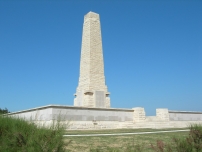| First Name: | Frederick George | Last Name: | BRACEY | |
|---|---|---|---|---|
| Date of Death: | 09/08/1915 | Lived/Born In: | Poplar | |
| Rank: | Sergeant | Unit: | Royal Irish Fusiliers5 | |
| Memorial Site: | Helles Memorial, Gallipoli | |||
Current Information:Born-Millwall
Gallipoli 1915 On 25 April, British, Australian and New Zealand forces landed on the Gallipoli peninsula. The plan was that these forces would soon defeat a demoralised Turkish army, knock Turkey out of the war, open up the Mediterranean to the Russian navy and threaten Austro-Hungary from the south. None of these things were achieved despite nine months of hard fighting in terrible conditions. It was a heroic failure. By July, 1915, and after much fierce fighting, stalemate had set in at Gallipoli both at Cape Helles where the British and French had landed and at Anzac Cove where the Australian and New Zealand Corps were unable to break out of their beach head. Fresh troops were needed and they were on their way in the shape of four divisions from Britain and things were put on hold until they arrived. The plan for August was for a landing at Suvla Bay to the north of Anzac Cove whilst at the same time, the ANZAC Corps, reinforced by some of the new British troops would effect a breakout from Anzac Cove and establish a line across the peninsula. Whilst this was going on the troops in the south at Helles would stage a number of diversionary attacks. But it all went horribly wrong and much of the reason for this can be explained by inadequate planning and leadership. Nobody seemed to know what they were supposed to be doing and Lieutenant-General Stopford, in charge of the Suvla landings was particularly out of his depth. The landings at Suvla failed to link up with the forces at Anzac and the breakout from there did not happen despite valiant efforts by all concerned. The loss of life on all fronts was again enormous. L.A. Carlyon’s excellent book “Gallipoli” gives a superb yet chilling account of the events. During the night of 6/7th August, 11th Division landed at Suvla and the following morning 10th Division began landing. The plan was that they would come ashore on A Beach but because of a great deal of confusion there some landed on C Beach and others on the northern shore of the bay and all plans had to be changed The main objective now for the Suvla force was the Chocolate Hills which were a gateway to the all important ANZAC sector but throughout 7th August order was followed by counter order as the various units tried to reorganise themselves. This took up valuable time and it was not until the evening that a force from 10th Division made up of 7th Royal Dublin Fusiliers, 30 Brigade plus 6th Royal Inniskilling Fusiliers and 5th Royal Irish Fusiliers, both of 31 Brigade was redirected to attack the hills from the east, while two battalions from 11th Division assaulted from the west. The small enemy force there put up a stout defence but eventually the hills were captured. On the following day, 9th August, they relieved the 7th South Staffordshire battalion in the firing line on the nearby Green Hill where the trenches were very shallow and where snipers were a constant threat. Two strong enemy counter attacks were repulsed and on 10th August, a party of volunteers went out to clear the snipers from dense bushes on their front, which they managed to do but only temporarily. On 12th August they were relieved and moved back to Chocolate Hill. One of their casualties during tthis period was Frederick Bracey who was killed on 9th August. |
||||
| « Back to Search Results | ||||
| If you think any of the information shown here is incorrect, Click Here to submit your amends and comments | ||||




